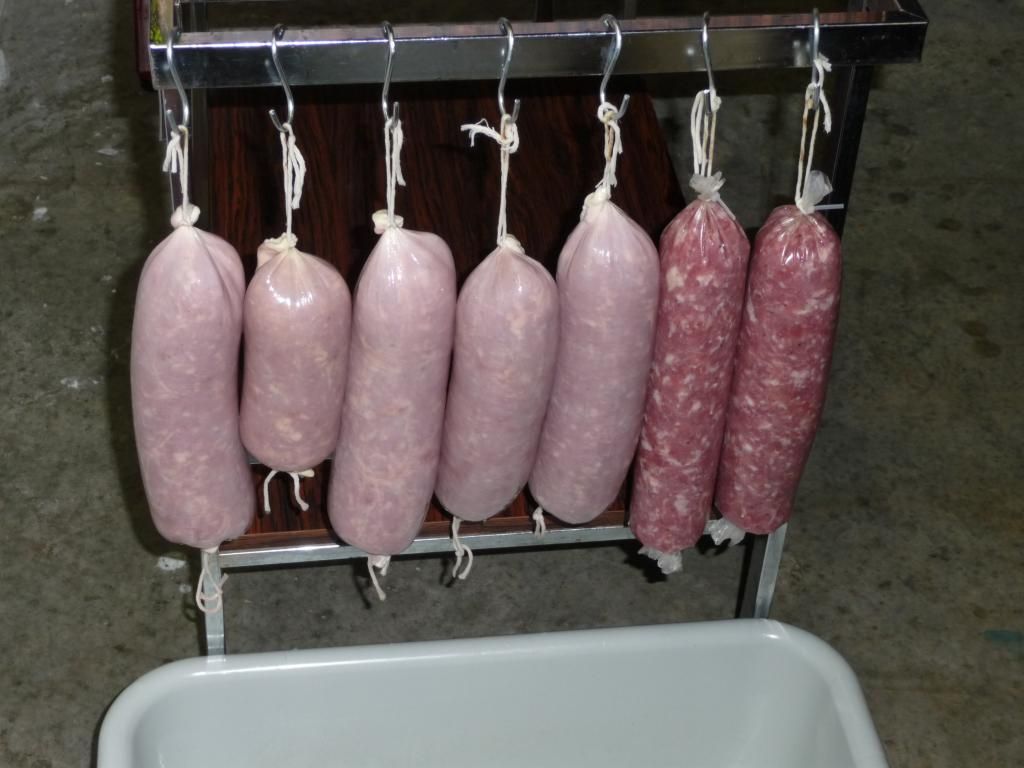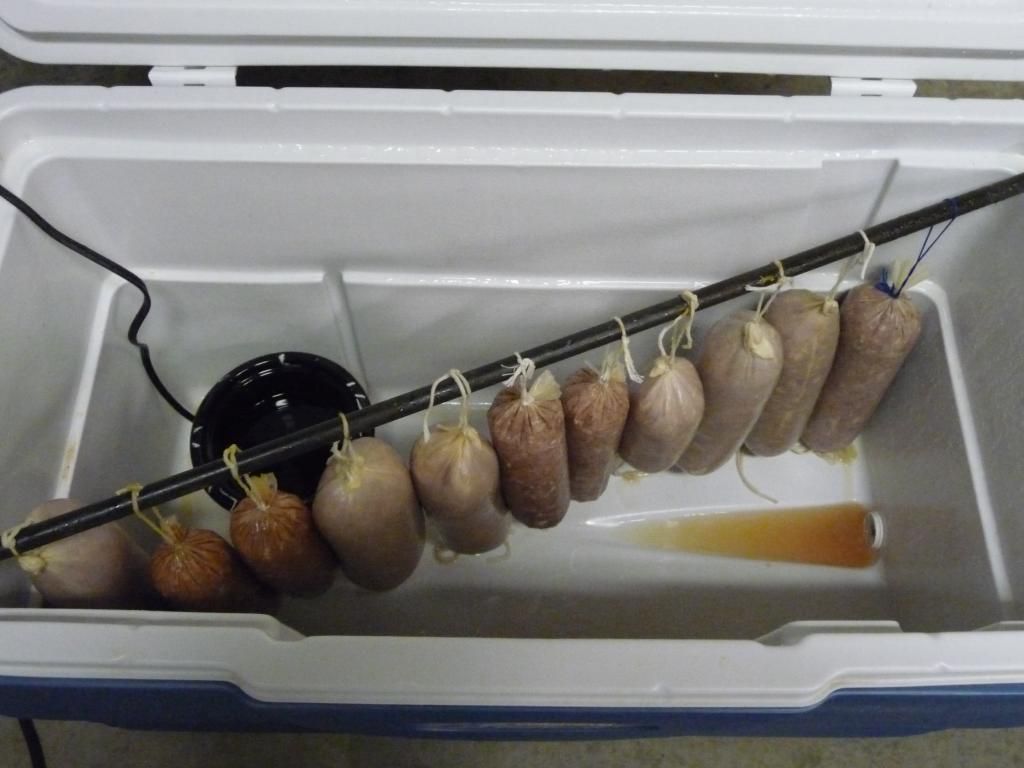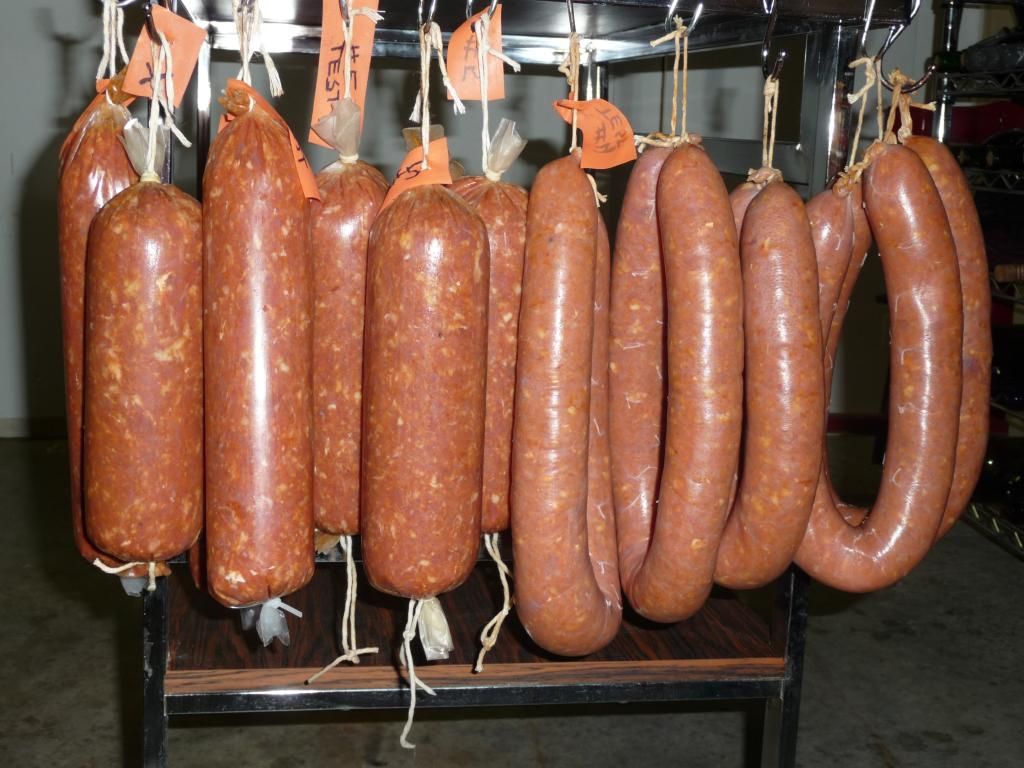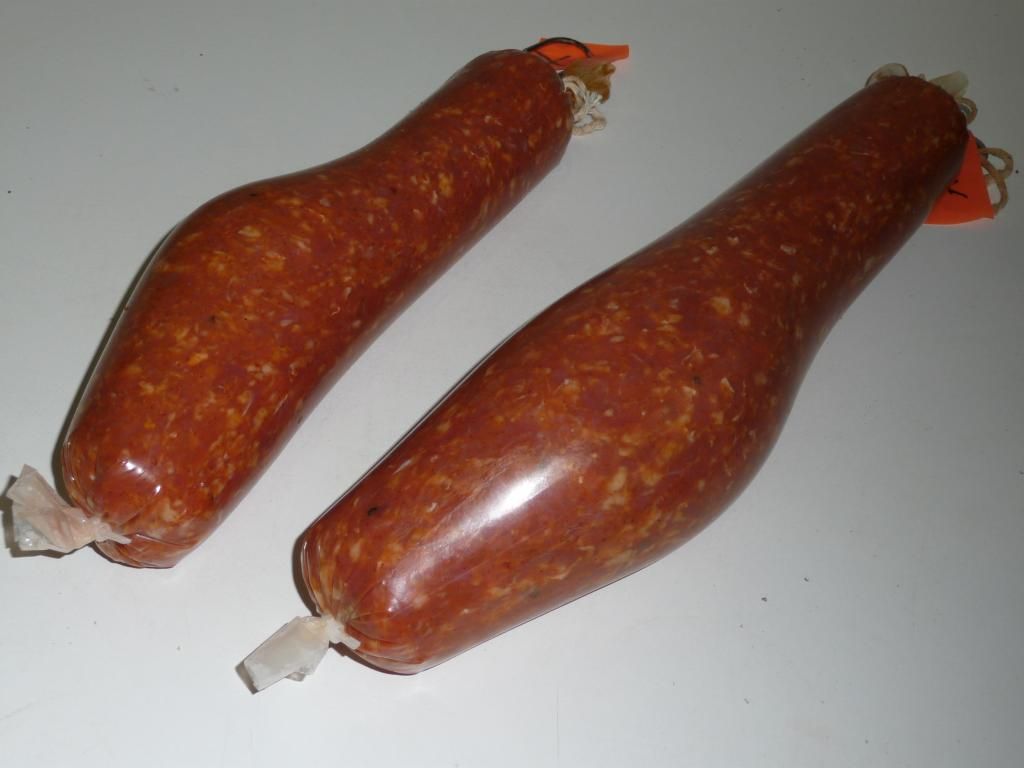Page 1 of 3
Umai Salumi vs. Chamber Salumi: Which tastes better?
Posted: Fri Feb 06, 2015 19:57
by redzed
A few days ago I made 3.5 kg of basic Genoa/Milano salame. Not sure what to call it since according to Marianski, Genoa has a coarser grind (10mm) and Milano a finer grind (5mm). I used a 7mm plate so would that make it a Salame Gelano, or perhaps a Salame Milnoa? Something to think about while the salame ripens.

I used Mondostart 2M (very close to Bactoferm F-RM-52) to ferment at 20-22C, 90% RH. My starting pH was 5.73, after 24 hours 5.26 and 4.85 after 40 hours. I did not want to take it below 5 because now it will most likely have a bit of tang. On the other hand, since this is more of an American salami, the the tang should be acceptable.
I stuffed 2 chubs into the 50mm Umai tubes and 41/2 into beef middles. All six were fermented together, and now the Umai are hanging in my fridge at 4C and the rest in my curing chamber at 12C and around 80% RH. The latter were also treated with a mould surface starter. The photo below shows the salame after the fermentation stage.
Over the next couple of weeks I will make two or three more types of salami and will use both the Umai and curing chamber method on each. When they all will have matured, I will invite friends (who know nothing about the preparation process), to taste and judge which salami they prefer. The Umai experiment has begun!
Salame Genoa

Posted: Fri Feb 06, 2015 20:44
by rgauthier20420
I'm really interested to see the results of this. I was very impressed the 1st time around with the UMAI bags, and for some reason, I've got beef middles in the fridge that I've yet to use

Posted: Fri Feb 06, 2015 21:12
by Shuswap
redzed wrote:When they all will have matured, I will invite friends (who know nothing about the preparation process), to taste and judge which salami they prefer.
Dang, having read the thread no invite

Chris you are obviously back home and in full gear.
Posted: Fri Feb 06, 2015 21:17
by Devo
LOL looks like you have not lost your touch the Red, thought maybe being on vacation you might have forgotten a thing or two but you seem to be right back at it.
Looking forward to the results you get from your friends.
Posted: Sat Feb 07, 2015 17:38
by Bob K
redzed wrote:A few days ago I made 3.5 kg of basic Genoa/Milano salame. Not sure what to call it since according to Marianski, Genoa has a coarser grind (10mm) and Milano a finer grind (5mm). I used a 7mm plate so would that make it a Salame Gelano, or perhaps a Salame Milnoa? Something to think about while the salame ripens.
Salame Genalano Red.
Posted: Sat Feb 07, 2015 22:41
by crustyo44
In regard to hole sizes in mincing plates, from what I have learned from my Italian friends and neighbours, from the South to the North of Italy, all pork is minced through a 12 mm plate, if you add beef or veal in the mix the size varies from a 6-8 mm plate.
These sizes are backed up by several Italian salami making books I have, one book is actually written and printed in Australia.
Cheers,
Jan.
Posted: Sat Feb 07, 2015 23:10
by redzed
You are right Crusty. A coarser grind in dry cured sausages is better because it will dry faster. But salami Genoa is actually an Americanized sausage, finer grind and has a bit of tang. And my version was made with 2.5kg pork and 1kg beef.
Posted: Sun Feb 15, 2015 22:24
by redzed
I made two more Salami for the experiment, an orange and fennel salame and a finnocchionna. Two small chubs from each were cased in the Umai tubes and are now hanging in the fridge. The remainder are in beef middles and are in my curing chamber. I fermented the salami with Bitec LM-1, containing L. curvatus and kocuria salsicia, and formulated for Italian salami. This was my first time using this starter which arrived from Canada Compound. Acidification was a lot slower than my last batch using Mondostart 2M. I fermented at 22C and reached a pH of 5 after 40 hours. Photo below shows the salami after the ferment.
Note the small electric crock pot filled with water, used to heat and humidify the makeshift fermentation chamber. I bought it at a thrift store for $4. Works great.

Posted: Mon Feb 16, 2015 15:14
by Bob K
That is an ingenious fermenting chamber!
What is the liquid on the bottom of the cooler (in the drain) ?
Posted: Mon Feb 16, 2015 21:06
by redzed
Bob K wrote:That is an ingenious fermenting chamber!
What is the liquid on the bottom of the cooler (in the drain) ?
That system works very well for me as I don't have to take up space with a more permanent set up. I just pull out the cooler when I need it and give it a good cleaning after each use. It keeps perfect temperature and RH is in the high 90s.
The liquid is what always comes of the salami and condensation in the cooler during the ferment, since it is air tight with no ventilation.
Posted: Wed Feb 25, 2015 08:02
by redzed
Over the weekend I made two different Spanish chorizos, Riojano and Pamploma. I used the recipes from Jeffrey Weiss, Charcuteria: The Soul of Spain. Half of the Pamploma were cased in protein lined collagen and half in the Umai tubes. The chorizo was fermented at 21C with Gewurzmuller LM-1 for 48 hours. The Riojano finished a with a pH of 5 and the Pamploma reading was 5.13. Good fermentation results, so I should not have any tang. The Pamploma is the fourth product that will be included in the comparative taste test. .
To update on the progress on the other three, it looks like the Umai Genoa is almost ready and the other two are also coming along well. One major difference between the Umai which are hanging in a regular refrigerator and their beef middle cased counterparts growing mould in the curing chamber, is that the Umai salami are losing weight at a much faster rate, in fact almost 50% faster.

Just finished fermentation . Pamploma on the left and Riojano on the right.

This is what happens when you try to stuff the Umai tubes too tightly. Fred Flinstone would have liked one of those.

Posted: Wed Feb 25, 2015 13:45
by Bob K
I had never seen those bowling pin specialty casings before

It would also be interesting to see if the Tublin casings lost weight faster in a curing chamber with traditional humidity and Temps.
Posted: Wed Feb 25, 2015 22:57
by Devo
Bob K wrote:I had never seen those bowling pin specialty casings before

It would also be interesting to see if the Tublin casings lost weight faster in a curing chamber with traditional humidity and Temps.
Ya I would be interested also. Funny my Genoa in the UMAi bags are no where near being done. On average they are about 16% - 18% and I started before you. Other than maybe different fridges mine are not hanging but just laying on the racks. Wonder if that has something to do with it?
Posted: Sat Feb 06, 2016 05:32
by harleykids
RedZed, how did the experiment with the Umai bags come out?
And can you run the umai bags in a normal 13C @ 82% RH curing chamber? Or o they have to be in the fridge at 33-35F and normal frost free fridge low humidity 20-30% RH?
Posted: Thu Mar 24, 2016 13:23
by LOUSANTELLO
#1 Umai's will take longer. I was told by Umai that once fermented, they need to go in a regular refrigerator. They are very much concerned about the mold growth at higher humidities. When I took a photo of the Umai's and sent it to them, they had a concern as to how much I made for one refrigerator. They didn't think I was going to be able to keep the humidity down low enough. If you have a chamber, I don't really know why you would even bother with Umai for curing. I do however use the Umai bags for dry aging prime rib and strip loins in a regular refrigerator.





